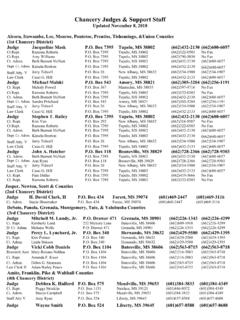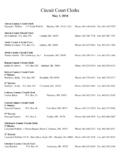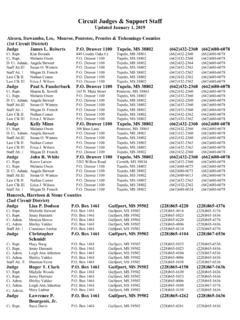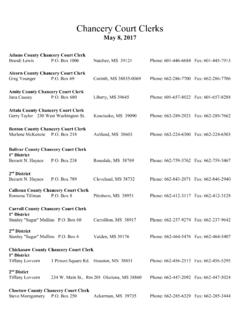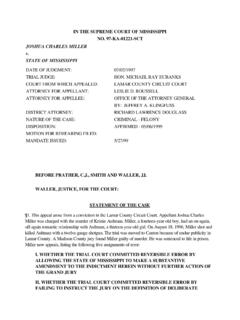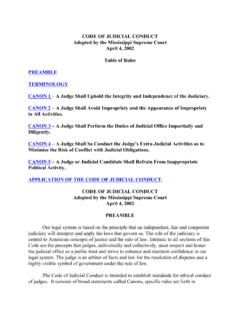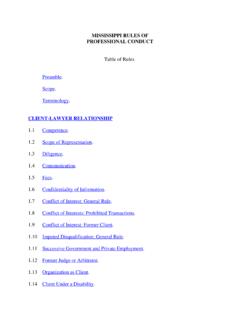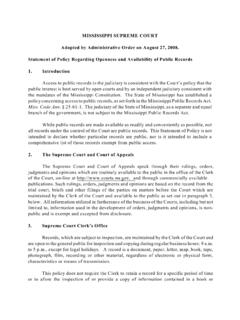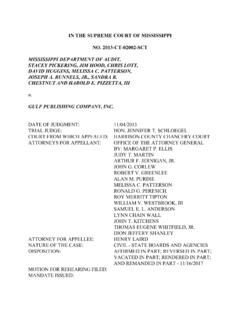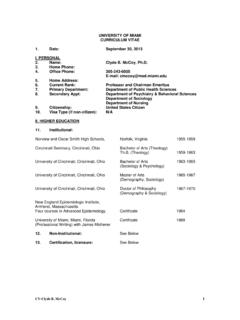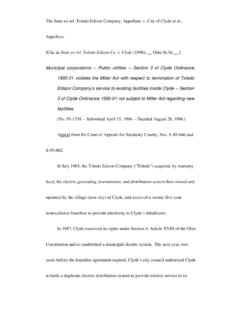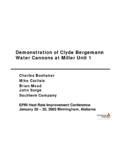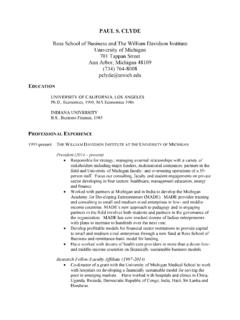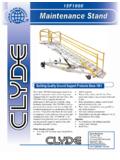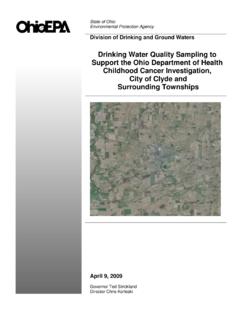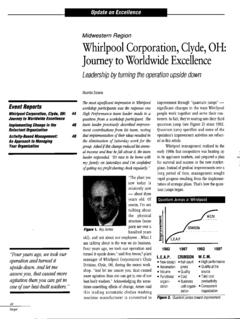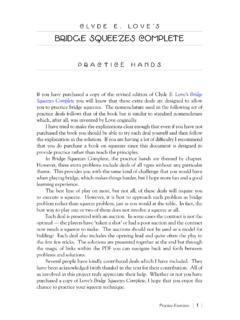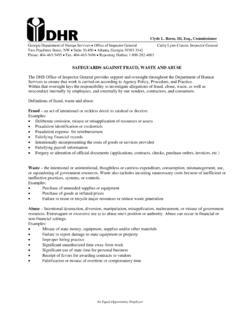Transcription of CLYDE WENDELL SMITH v. STATE OF MISSISSIPPI
1 IN THE SUPREME COURT OF MISSISSIPPI . NO. 1999-DR-01394-SCT. CLYDE WENDELL SMITH . v. STATE OF MISSISSIPPI . DATE OF JUDGMENT: 7/1/1993. TRIAL JUDGE: HON. GRAY EVANS. COURT FROM WHICH APPEALED: LEFLORE COUNTY CIRCUIT COURT. ATTORNEYS FOR APPELLANT: PRO SE. ALAN M. FREEDMAN. C. JACKSON WILLIAMS. OFFICE OF CAPITAL POST-CONVICTION. COUNSEL. BY: ROBERT M. RYAN. WILLIAM J. CLAYTON. LOUWLYNN VANZETTA WILLIAMS. ATTORNEYS FOR APPELLEE: OFFICE OF THE ATTORNEY GENERAL. BY: MARVIN L. WHITE, JR. JEFFREY A. KLINGFUSS. DISTRICT ATTORNEY: FRANK CARLTON. NATURE OF THE CASE: CIVIL - DEATH PENALTY - POST. CONVICTION. DISPOSITION: APPLICATION FOR LEAVE TO SEEK POST- CONVICTION RELIEF GRANTED IN PART. AND DENIED IN PART - 05/20/2004. MOTION FOR REHEARING FILED: MANDATE ISSUED: EN BANC. COBB, PRESIDING JUSTICE, FOR THE COURT: 1. CLYDE WENDELL SMITH (hereafter SMITH ) was convicted of the capital murder of Johnny B.
2 SMITH in the Leflore County Circuit Court in 1993. Prior to that trial, SMITH was allowed by the trial court to override the advice of his counsel,1 and the trial court rescinded its earlier order of severance, thus allowing SMITH and his brother, Jerome, to be tried jointly, in both the guilt phase and the sentencing phase. SMITH 's conviction and sentence to death by lethal injection were affirmed by this Court in SMITH v. STATE , 729. 1191 (Miss. 1998). This Court denied his motion for rehearing on February 25, 1999, and the United states Supreme Court denied SMITH 's petition for writ of certiorari on June 24, 1999. SMITH v. MISSISSIPPI , 527 1043, 119 2410, 144 808 (1999). SMITH 's motion for rehearing was denied on August 23, 1999. SMITH v. MISSISSIPPI , 527 1059, 120 2410, 144 830 (1999). 2. SMITH filed a skeletal pro se petition for post-conviction relief on August 23, 1999.
3 Thereafter, in accordance with Jackson v. STATE , 732 187 (Miss. 1999), this Court remanded the post- conviction proceedings to the Leflore County Circuit Court for appointment of qualified counsel to represent SMITH . Counsel has since been appointed and has filed a supplemental application for post- conviction relief, subsequently amended to include an Atkins claim, which is presently before this Court. FACTS. 3. The factual background in this case was laid out in detail in the opinion in the direct appeal. See SMITH v. STATE , 729 at 1195-99. This Court, in a 5-3-1 decision, concluded that there was evidence sufficient to support the verdict, and found no reversible error. A review of the facts reveals that on the night of November 7, 1992, at approximately 9:00 , Johnny B. SMITH was killed in the liquor 1. Trial counsel was also appellate counsel on direct appeal. 2.
4 Store he owned in Sidon, MISSISSIPPI . He was shot three times, and two of the wounds were fatal. Taken from the store were a cash register and an extra cash drawer. Also missing was Johnny SMITH 's handgun, which was either a .32 or .38 caliber weapon, and the projectiles recovered from his body and from the scene were consistent with those of a .38 caliber weapon. Fingerprints found on the counter were identified as matching those of SMITH 's co-defendant, his brother Jerome SMITH . 4. Testimony for the STATE at trial was given by more than a dozen witnesses, including two men who drove by the liquor store between 9:00 and 10:00 that night and saw a red and white car parked near the liquor store. Two Leflore County deputies (one being the victim's brother) testified that they were on patrol that night and, just before receiving a call about the shooting, they saw a red car parked near the liquor store, and two people sitting in the car, who slid down in their seats as the patrol car passed by.
5 The victim's thirteen-year-old son, Kevin, was at his father's store just minutes before the robbery and murder, and testified that as he was leaving the store, two black men came by him, going toward the store, and one was wearing the cap recovered by the police outside the store after the murder. At trial, Kevin identified SMITH and Jerome as the men he saw that night. Several witnesses placed the victim in his store, still alive shortly before 9:00 on the night of his murder. 5. Carolyn Pearce testified that around 2:00 on the morning after the murder, she was with SMITH and Jerome in a red and white car in Indianola, when they bought crack cocaine and SMITH , who had many loose bills, talked about buying $300 or $400 more cocaine. Outside the presence of the jury, Pearce stated that both men raped her before putting her out of the car. 6. A police officer for the town of Isola testified that he was on patrol when he spotted a red and white automobile leaving a service station around 3:00 He followed the car, noticed that it was weaving, stopped it, and then recognized SMITH and Jerome.
6 Because they seemed nervous, he talked with 3. them for a few minutes, and after allowing them to leave, the officer advised the Humphreys County Sheriff's Department to keep an eye out for the vehicle because the brothers were acting suspicious. 7. Putting these details together, the officers later saw the vehicle, turned around to follow it, and subsequently chased the brothers into a field after they abandoned the vehicle on the side of the road. When the officers looked into the vehicle, they could see a sawed-off .410 shotgun on the back floorboard, and subsequently found a set of keys later identified as fitting the lock on the liquor store where the robbery and murder had earlier taken place. 8. SMITH and Jerome presented an alibi defense, with testimony not only from their sister, but also from SMITH 's girlfriend and the owner of the Isola Lounge. None of them, however, presented evidence to conclusively prove that the SMITH brothers could not have been in Sidon at approximately 9:00 when Johnny SMITH was killed.
7 By noon the day following the murder the police had obtained warrants for SMITH and Jerome, who were arrested and incarcerated in the Leflore County jail. ISSUES. 9. SMITH 's attorney raises eighteen issues in the petition for post-conviction relief and amendment thereto. The issues before this Court today involve, either directly or within the context of ineffective counsel, the following: (1) shackling during trial; (2) juror misconduct in both guilt and penalty phases; (3). failure to preserve Batson issues; (4) failure to fully present mitigation evidence at sentencing; (5) need to review death sentence in light of new evidence outside the record and co-defendant's life sentence; (6). exclusion of certain jurors; (7) no impeachment of material witness; (8) presence of sheriff in courtroom during trial proceedings; (9) allowing joint trial with co-defendant; (10) excusing of potential jurors after unrecorded bench conferences; (11) failure to object to jury instruction regarding aggravating and mitigating circumstances of equal weight; (12) prosecutor's improper closing argument in guilt phase and (13) in 4.
8 Penalty phase; (14) erroneous instruction re: aggravating and mitigating circumstances; (15) jury failure to find degree of SMITH 's personal culpability; (16) jury instruction did not inform of all three sentencing options; (17) cumulative error, and (18) vacating SMITH 's death penalty due to mental retardation. 10. SMITH 's skeletal pro se petition raises five very general issues, each consisting of only one sentence, claiming: ineffective assistance of counsel (1) at trial, (2) at sentencing and (3) on appeal; also (4) failure to provide unknown and unidentified possibly exculpatory material; and (5) many other fact based claims . that cannot be investigated without assistance. The first three fall within the eighteen raised by counsel and are combined there for discussion. The other two are so vague and non-specific as to be meaningless. 11. We conclude that the only claim which warrants post-conviction relief is the Atkins claim set forth in the amendment to the petition filed by counsel.
9 All other claims set forth in the pro se petition and counsel's petition are without merit and are denied. DISCUSSION. 12. The majority of the issues presented relate to claims of ineffective assistance of counsel. SMITH was represented at trial and on direct appeal by Wallace Stuckey and Whitman Mounger. The standard for determining if a defendant received effective assistance of counsel is well settled. "The benchmark for judging any claim of ineffectiveness [of counsel] must be whether counsel's conduct so undermined the proper functioning of the adversarial process that the trial cannot be relied on as having produced a just result." Strickland v. Washington, 466 668, 686, 104 2052, 80 674 (1984). A. defendant must demonstrate that his counsel's performance was deficient and that the deficiency prejudiced the defense of the case. Id. at 687. "Unless a defendant makes both showings, it cannot be said that the conviction or death sentence resulted from a breakdown in the adversary process that renders the result unreliable.
10 " Stringer v. STATE , 454 468, 477 (Miss. 1984), citing Strickland v. 5. Washington, 466 at 687. The focus of the inquiry must be whether counsel's assistance was reasonable considering all the circumstances. Id. Judicial scrutiny of counsel's performance must be highly deferential. (citation omitted).. A fair assessment of attorney performance requires that every effort be made to eliminate the distorting effects of hindsight, to reconstruct the circumstances of counsel's challenged conduct, and to evaluate the conduct from counsel's perspective at the time. Because of the difficulties inherent in making the evaluation, a court must indulge a strong presumption that counsel's conduct falls within the wide range of reasonable professional assistance; that is, the defendant must overcome the presumption that, under the circumstances, the challenged action 'might be considered sound trial strategy.
